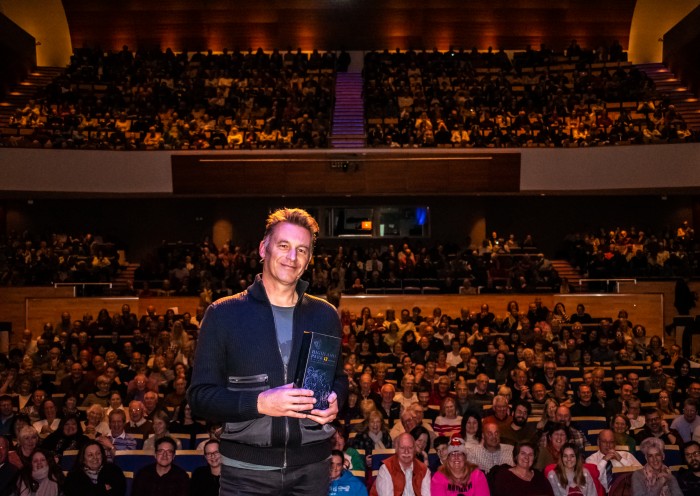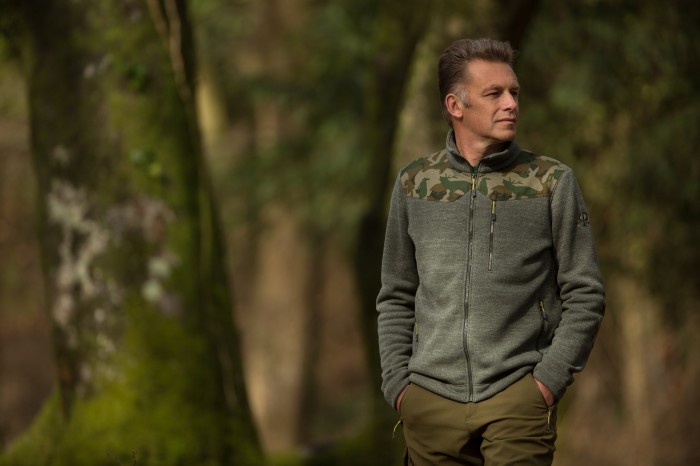×
Before Chris Packham walked on the stage at Perth Concert Hall tonight I honestly had no idea what his talk was going to be about. You might call that lazy journalism but I prefer to think of it as attending an event unfettered by any preconceived notions or encumbered by any expectations. Besides, I didn't have time to read up on it. Jeez! Get off my back!
Tonight's talk was organised by the good folks at The Royal Scottish Geographical Society. I had previously been at a fascinating and inspiring talk by Marine Conservationist Catherine Gemmell that they hosted at The Salutation Hotel. I had high hopes that Packham would be equally compelling.
I'm here with my good friend Dave, who like me, is a child of the '80s. Every generation probably thinks that their generation had the best children's television but unless they grew up in the '80s they are quite simply wrong. 'Button Moon',  'Pigeon Street', 'He-Man' and 'Thundercats' could wipe the floor with 'Power Rangers', 'Keenan and Kel', or 'In the Night Garden'. Then, of course, there was 'The Really Wild Show'.
'Pigeon Street', 'He-Man' and 'Thundercats' could wipe the floor with 'Power Rangers', 'Keenan and Kel', or 'In the Night Garden'. Then, of course, there was 'The Really Wild Show'.
Chris Packham was with this amazing educational but somehow still insanely fun show for 11 years starting in 1986. For some reason, I remember his co-host Michaela Strachan being with the show for most of this time but she didn't actually join until 1993 by which time, at the age of 15, I should really have stopped watching children's television.
After a short presentation by RSGS chief executive Mike Robinson, Chris Packham takes the stage to rapturous applause. "Never clap at the beginning", he Clad in a skinny grey top, drainpipe trousers, a pair of black brothel creepers and with his quiff gelled firmly in place he looks a little bit like Mark Kermode's little brother. admonishes us, "it might be rubbish".
Clad in a skinny grey top, drainpipe trousers, a pair of black brothel creepers and with his quiff gelled firmly in place he looks a little bit like Mark Kermode's little brother. There is a reason for his attire though, it turns out he has been filming a BBC documentary on Punk music.
Throughout the evening Chris talks passionately and eloquently about the transformative power of music. The way he talks about music's (in his case punk) ability to give hope and a sense of belonging and identity really resonates with me and I find myself liking him even more (after writing this my friend Paul told me that Chris once wore a Primal Scream t-shirt on 'The Really Wild Show').
The main reason we are here tonight though is Chris's photography and it is breathtaking. Many of you who have seen the BBC documentary 'Chris Packham: Aspergers and Me' will know that Chris is autistic. He touches briefly on his autism tonight, mainly in how it affects his work.
Chris says that his condition is one of the main reasons he prefers to shoot in black and white or monochrome. "For me, photography is about control. You can control colour by getting rid of it."
There is also an almost Kubrickian perfectionism and eye for detail present in Packhams best work. He gives us a great insight into his process when he shows us a shot of three stilt birds that he took in a sewage treatment plant in the Gambia. My first thought was 'what a great picture', however as soon as Chris  pointed out the imperfections he perceived in it they began to irk me too.
pointed out the imperfections he perceived in it they began to irk me too.
The major issue was the flecks of greenery that just didn't fit in tonally with the rest of the colours. Instead of saying, "Oh well, I guess that's as good as it gets" and calling it a day Chris hot-footed it back to his accommodation to grab a table fork. He then lay on his belly and weeded out the offending plants. The resulting picture truly was perfect.
Human beings have never really been Chris's ideal photographic subject matter. "I like people on an individual basis", he assures us, it's just as a species we have never learned to play nice with our ecosystem. However, that changed when he met the Orang Rimba, a tribe of hunter-gatherers in the rainforests of Sumatra, Indonesia. It was the first time he had ever seen people living in perfect harmony with their environment.
One iconic photograph that Chris took, a picture of a young tribal girl, has since become immensely important to him as a measure of how we are treating our environment. Twenty years later he returned to Sumatra with a BBC film crew, hoping to find the girl from the photograph.
It turns out that was no easy feat. In the intervening year's swathes of the Sumatran rainforest have been destroyed, millions of hectares replaced with palm oil crops. Chris does finally manage to track down the girl but you can't really describe it as a happy ending. Her life is almost unrecognisable from twenty years ago.
Hearing Chris talk about Sumatra finally made the palm oil issue real for me. Up until that point, I was aware that palm oil was responsible for deforestation and that it should be avoided if possible, however, I only made the most cursory of efforts in that direction. Sure, occasionally I would opt for palm oil-free peanut butter (if the price difference wasn't too great) and give myself a massive pat on the pat. However, palm-oil is creeping on to the ingredients list of more and more of our everyday products, so if we want to avoid it we really do have to Chris is a genuinely funny guy and even manages to convince a mother to get her son a corn snake for Christmas.educate ourselves.
When he is finished his talk Chris is presented with a cheeky wee bottle of Highland Park (nice!) before fielding some questions from the audience. Chris is a genuinely funny guy and even manages to convince a mother to get her son a corn snake for Christmas (if your reading this please let us know if he got the snake).
I mentioned earlier that this is the second RSGS talk that I have attended and again I have been surprised at how much I have enjoyed it and how much it connected with me. I definitely wouldn’t consider myself a natural conservationist but both talks have genuinely made me rethink my outlook. I'll certainly be checking out The Royal Scottish Geographic Society website for more information and to keep an eye on upcoming events.
Perth's very first zero waste shop is opening soon, allowing eco-conscious shoppers to grab food and household products, free of wasteful packaging.
January 13th Monday 2020
Stagecoach are leading the way in the transition to a cleaner public transport future, which will provide a host of benefits to local communities.
January 6th Monday 2020
Christmas is a wonderful excuse to go all out extra, but how about applying some planet-friendly mindfulness to your celebrations?
December 16th Monday 2019